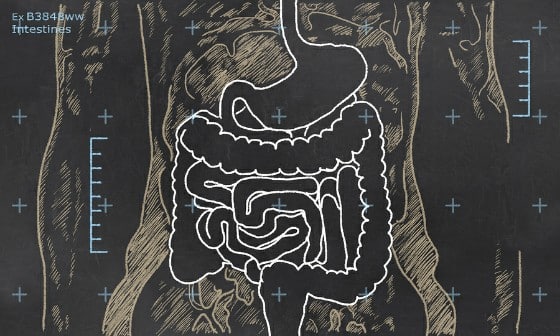Hydrochloric acid, also known as HCL, is really critical for our health for a variety of reasons. In the stomach, it helps other gastric acids (potassium chloride and sodium chloride) break down proteins and it directly kills pathogens like Candida, parasites, viruses, and bacteria and prevents them from traveling further into the gastrointestinal tract.
Therefore, the lack of sufficient levels can be a major contributor to Candida overgrowth, parasite infection, or SIBO. Other problems like a B12 deficiency may develop as B12 can’t be assimilated without HCl, or amino acid deficiencies due to inadequate break down of protein that is critical for the production of neurotransmitters that regulate our moods, energy, appetite, cognitive functions, and gut health and antibodies that protect us from pathogens.
However, the release of hydrochloric acid also affects numerous critical functions downstream like inciting the pancreas to release enzymes that are needed for digestion and the gallbladder to release bile to digest fats. If HCL is not present, then these actions are not going to be triggered, so digestion may become significantly impaired altogether. On the other hand, too much hydrochloric acid will produce some serious discomfort, damage the stomach, and can lead to the development of ulcers. So we don’t want to go too far in that direction either. Therefore, one should know whether they need to supplement with HCL before doing so.
Furthermore, according to Dr. Jonathan Wright and his book, Why Stomach Acid is Good for You, HCL supplementation should not be combined with a variety of medications like anti-inflammatories (corticosteroids, aspirin, Indocin, ibuprofen, or other NSAIDs.) Not only that, these medications can damage the stomach lining so much so that you may not be able to handle HCL even when it is needed. So be sure to consult with your doctor prior to supplementation.
The Betaine HCL Challenge test is the easiest and most affordable way to assess hydrochloric acid levels and it can also tell you how much supplementation is needed if required. Here’s how you do it:
- Purchase a bottle of betaine hydrochloride tablets with pepsin.
- Take one tablet with a meal. If this results in burning in the abdomen area and/or indigestion, then you are producing enough hydrochloric acid and no supplementation is needed. If this does not generate burning or indigestion, then proceed to the next step.
- Take two tablets of HCL with a meal. If burning and indigestion develop, then this indicates that one tablet is sufficient to replenish your HCL levels. If no burning or indigestion develop, then proceed to the next step.
- Take three tablets of HCL with a meal. If burning and indigestion develop, then this indicates that two tablets are sufficient to replenish your HCL levels. If no burning or indigestion develop, then proceed to the next step.
- Continue to increase tablets of HCL until you find the dose that works right for you.
Repeat the test a couple of times on different days just to confirm.
Please note that HCL should never be taken on an empty stomach.
However, if you want to get more scientific, there is a lab test for HCL called the Heidelberg test, but it’s a lot more expensive than the betaine HCL challenge test.
A variety of factors can contribute to low levels of hydrochloric acid including over-the-counter antacids or other acid-suppressing medications like proton pump inhibitors, ulcer medication, chlorinated drinking water, and infection with H. pylori if it inhabits the middle of the stomach where it will impair the cells that produce HCL. If H. pylori inhabits the duodenum, it can lead to excess production.
Additionally, peptides found primarily in protein stimulate the secretion of gastrin from G-cells. Then gastrin stimulates the release of histamine and histamine stimulates parietal cells to secrete HCL. Thus, insufficient levels of histamine will prevent the secretion of HCL. Additionally, the parasympathetic nervous system via the vagus nerve works with gastrin to stimulate parietal cells, so too much sympathetic nervous system activity and lack of parasympathetic nervous system activity or problems with the vagus nerve may also inhibit production.
Furthermore, when we age, our ability to secrete stomach acid (composed of hydrochloric acid, potassium chloride, and sodium chloride) significantly declines, so aging can be another underlying factor and make us more susceptible to Candida overgrowth and other microbial problems. One study found that there is nearly a 70 percent drop in secretion of stomach acid in 61 to 70-year-olds.
Having sufficient HCL is critical for everyone, but if you have a gut disorder like Candida, SIBO, IBS, GERD, parasites, etc., then it is vital for the healing journey that you assess your levels and attend to accordingly.
However, this is only one important aspect that needs to be tackled. You can find everything you need to know for addressing Candida overgrowth, in my ebook, Candida Secrets.


Dear Cynthia,
I would like to do that test on Betain HCI but struggle with dosage. You write that one has sideeffects of one Betain HCI tablet if enough stomach acid is present. But what dosage should the tablet has? I have seen products with 300 or 600 or 80o in it. On which of those dosages the test reffers?
Hi Nicole,
I would start with the lowest dose possible.
Best,
Cynthia